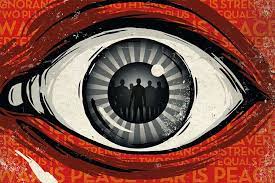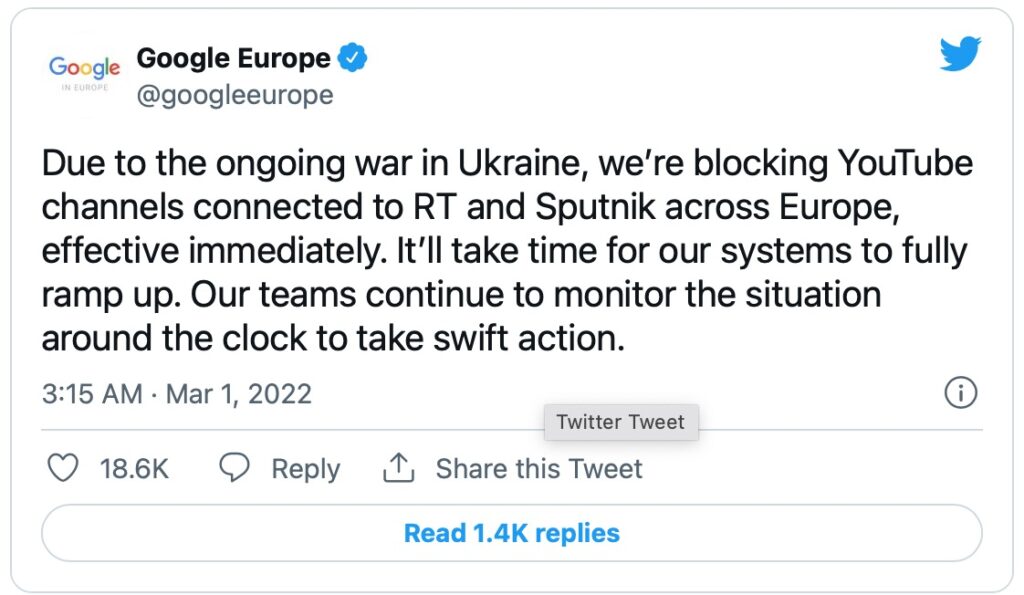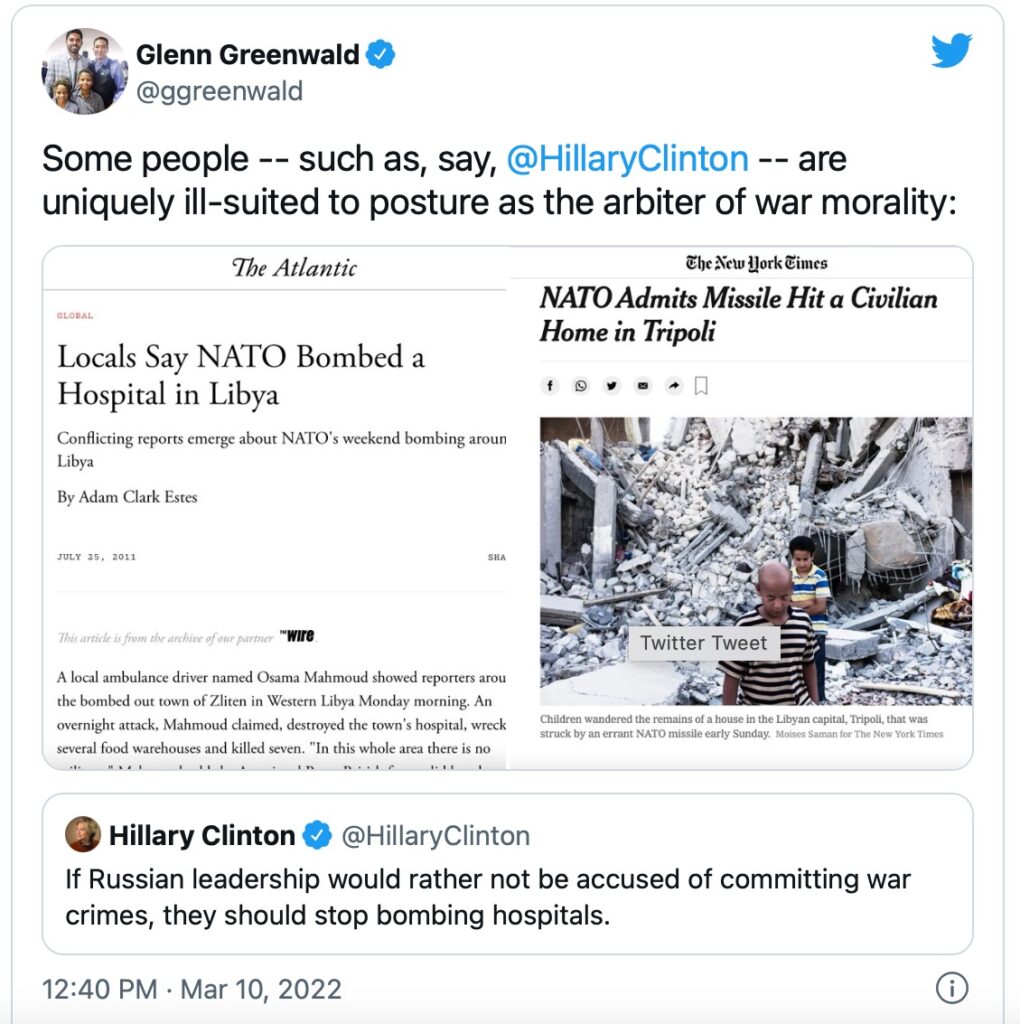
Matt Taibbi: Orwell was right
This weekend I re-read 1984, a book I tend to reach for when I get Defcon-1 depressed about the state of the world. Deep in the novel, Winston ponders the intricacies of doublethink:
To know and not to know, to be conscious of complete truthfulness while telling carefully constructed lies, to hold simultaneously two opinions which canceled out, knowing them to be contradictory and believing in both of them… To forget whatever it was necessary to forget, then to draw it back into memory again at the moment when it was needed, and then promptly to forget it again… that was the ultimate subtlety.
In the last weeks, Russia took an already exacting speech environment to new extremes. A law was passed that would impose 15-year prison sentences for anyone spreading “fake news” about the Ukraine invasion; access was cut to Facebook and Twitter; stations like Echo Moskvi and TV Rain as well as BBC Russia, Radio Liberty, the New Times, Deutsche Welle, Doxa, and Latvia-based Meduza were effectively shut down; Wikipedia was threatened with a block over its invasion page; and national authorities have appeared to step in to prevent coverage of soldiers killed in the war, requiring local outlets to use terms like “special operation” instead. The latter development is connected to the state media regulator, Roskomnadzor, issuing a remarkably desperate dictum requiring news outlets to “use information and data received by them only from official Russian sources.”
Russia also appears in the middle of a general crackdown on local media, not so much because those outlets are dissenting, but because they’re more likely to provide indirect evidence of war failures or the effect of sanctions. The desperation to control news has grown to the point where Russian diplomats in foreign countries are pressuring state outlets in countries like Iran to stop using the term “war” to describe what’s going on in Ukraine.
On the flip side, a slew of actions have been taken to crack down on “fake news” and “misinformation” in the West. The big one was the European Union banning RT and Sputnik: Facebook, Twitter, TikTok, and YouTube also cut access to all Russian state media, because the EU sanctions also required that internet platforms delist any RT or Sputnik content, even from individuals. The statute reads, “As regards the posts made by individuals that reproduce the content of RT and Sputnik, those posts shall not be published, and if published, shall be deleted.”
Facebook, Twitter, TikTok, and YouTube also cut access to all Russian state media, because the EU sanctions also required that internet platforms delist any RT or Sputnik content, even from individuals. The statute reads, “As regards the posts made by individuals that reproduce the content of RT and Sputnik, those posts shall not be published, and if published, shall be deleted.”
Other governments across the West, from Australia to Canada, have taken similar actions. In the U.S., Google and YouTube disallowed Russian state media ads (following a request by Senator Mark Warner) and demonetized “a number of Russian channels,” including RT but also many non-Russian individuals, before proceeding to demonetize all individual Russian content creators, even the individuals opposing the invasion. Even DuckDuckGo, the speechier, more pro-privacy alternative to Google, announced it was de-ranking “sites associated with Russian disinformation.” A growing list of Westerners have seen accounts frozen for supposed parroting of Russian talking points or “abusive” commentary.
YouTube flagged [*An earlier version of this story inaccurately used the term “banned”] Oliver Stone’s documentary Ukraine on Fire, while Netflix is going so far as to shelve a production of Anna Karenina. In what might have been the craziest move of all, Meta reportedly followed up a decision to un-ban the neo-Nazi Azov Battalion with a mind-blowing decision to alter its hate speech policies to “allow Facebook and Instagram users in some countries to call for violence against Russians and Russian soldiers in the context of the Ukraine invasion,” according to internal emails seen by Reuters.
One would hope there would be at least a few Americans left who’d hear about Russia barring the BBC and Voice of America and at least recognize the sameness of the issue involved with banning RT and Sputnik. Or, seeing how pathetic and manipulative it is for Russians to prevent reporting on war casualties, we’d recall the folly of the ban we had for nearly twenty years on photographs of military coffins, or the continuing pressure on embeds to avoid publishing images of American deaths from our own war zones. We should be able to read that Twitter and Facebook are cracking down on the “fake accounts” spreading “misinformation” that “Ukraine isn’t doing well” and notice that Russia’s measures against “fake news” and “disinformation” about its own military failures — though far more draconian and carrying much more severe penalties — are rooted in the same concept.
We don’t, however, because we long ago reached the doublethink phase predicted by Orwell, where most of the population is conscious of double standards but ignores them effortlessly. A healthy person should be able to be horrified by what’s happening in Russia and also see a warning about the degradation that ensues from using “pre-emptive” force, or from trying to control discontent by erasing expressions of it. But years of relentless propaganda have trained Americans to doublethink their way out of such insights. Cornel West just laid all of this out in an interview with the New Yorker:
Everybody knows if Russia had troops in Mexico or Canada there would be invasions tomorrow. [Biden] sends the Secretary of State, telling Russia, “You have no right to have a sphere of influence,” after the Monroe Doctrine, after the overthrowing of democratic regimes in Latin America for the last hundred-and-some years. Come on, America, do you think people are stupid? What kind of hypocrisy can anybody stand?
That doesn’t mean that Putin is not still a gangster—of course he is. But so were the folk promoting the Monroe Doctrine that had the U.S. sphere of influence for decade after decade after decade after decade, and anybody critical of you, you would demonize. Yet here are you, right at the door of Russia, and can’t see yourself in the mirror. That’s spiritual decay right there, brother, it really is.
We’ve been trained to rage against this thinking. We even have our own borrowed Newspeak word for the offense: Whataboutism. The offender supposedly does a bait-and-switch, distracting with charges of hypocrisy without refuting the actual argument. But a Soviet giving a professionally two-faced answer to questions about Gulags by saying, “And you lynch blacks” isn’t the same as the much more serious thing West is talking about. Lying to others is shameful, but lying to ourselves and not even realizing it, that’s hardcore spiritual decay. We’re being driven faster toward the cliff-edge of this moral insanity with each new act of mass forgetting.
The ideal citizen of Orwell’s Oceania bubbled with rage a mile wide and a millimeter deep and could forget in an instant passions that may have consumed him or her for years. We just did this, with a pandemic that had the country steaming with indignation until it was quietly declared over the moment Putin rolled over Ukraine’s borders. We switched from “the pandemic of the unvaccinated” to “Putin’s price hikes” in a snap. National outrage moved a few lobes over with zero fuss, and now we hate new people; instead of “anti-vax Barbie,” we’re barring Russian and Belarussian kids from the Paralympics.
It appeared that there had even been demonstrations to thank Big Brother for raising the chocolate ration to twenty grams a week. And only yesterday, he reflected, it had been announced that the ration was to be reduced to twenty grams a week. Was it possible that they could swallow that, after only twenty-four hours? – 1984
A heartbeat ago politicians and pundits all over were denouncing Canadian trucker protests over reports of swastikas. “Conservative Party members can stand with people who wave swastikas,” said Prime Minister Justin Trudeau. This was despite the fact that even Snopes concluded the photographed “swastikas” weren’t expressions of neo-Nazi sentiment, but protesters comparing Justin Trudeau’s government to Nazis.
Now the swastika in the Ukrainian context has been un-banned by Facebook, you can buy Azov Battalion mugs and t-shirts on Amazon, and we have headlines like “Are there really neo-Nazis fighting for Ukraine? Well, yes — but it’s a long story.” In an effort to argue that Putin is worse than Hitler, we have people like Atlantic Council senior fellow Anders Aslund saying “Hitler had more arguments for his attack on Poland,” and former U.S. Ambassador and Stanford professor Michael McFaul saying on live TV that Hitler “didn’t kill ethnic Germans, German-speaking people.”
This isn’t to say the Russian propaganda about “deNazifying” Ukraine should be taken seriously, but it’s amazing, isn’t it, how quickly our conventional wisdom changes its stance even toward something like neo-Nazism — an absolute one day, an Amazon impulse buy the next.
Just a few days ago, Secretary of State Anthony Blinken was hot for Poland to send MiG fighter jets to Ukraine. “That gets a green-light,” Blinken said. White House spokesperson Jen Psaki, when asked if Putin wouldn’t consider delivering jets to Ukraine an act of war, answered sharply, “First of all, there’s already a war going on in Ukraine.”
Then Poland called America’s bluff and said it was happy to send the planes, provided they were delivered through Germany by way of the U.S. Blinken immediately reversed course and said transporting the jets that way lacked a “substantive rationale.” We were reminded that “the transfer of combat aircraft could be mistaken for an escalatory step” and that Putin had said he would consider such a delivery an… act of war.
Moral panics erase memories. It’s their primary function. 9/11 wiped the national hard drive of everything from the third degree to My Lai to Operations Phoenix and Condor to the Church Committee to the School of the Americas to countless other shameful episodes, and the lessons learned from them. The Trump-Russia scandal blotted out Snowden, made the spooks the good guys again. 2016 rehabilitated neoconservatives, now reinvented as never-Trumpers, cleaning away the shame of Iraq, Abu Ghraib, Afghanistan, etc.
The “misinformation” panic wiped out the WMD fiasco, restoring honor to credentialed press. The DNC leak erased “Collateral Murder.” After George Floyd we hated cops, after January 6th we loved them. Ukraine now is openly being sold as a blue-pill cure for everything that went wrong during the War on Terror, including the recent defeat in Afghanistan. “Realism” is in disgrace, and “leadership,” “regime change,” and the “universal appeal of freedom” are back, only this time their primary backers are the upper-class cosmopolitan Democrats who marched against the simplistic “freedom against evil” plot neoconservatives tried to sell them twenty years ago.
We’re at the end of a twenty-year cycle that has taken what was once the oppositional-skeptic portion of the American population and seen them rallied behind the people they once hated the most. This has been accomplished by keeping us in a rage that always escalates and is never watered down by contradictions, thanks to mastery of “reality control” via “an unending series of victories over your own memory.”
The relentless parade of panics listed above (just a small sample; we’ve had dozens just in the last few years) makes those victories easy, and every time we switch targets, from Russians to neo-Nazis to cops to transphobes to insurrectionists to the unvaccinated to truckers and back to Russians again, the Church of Forgetting picks up new converts.
When I first read 1984, it was difficult to imagine how Emmanuel Goldstein could be a villain for “advocating freedom of speech, freedom of the press, freedom of assembly, freedom of thought” or for “demanding the immediate conclusion of peace with Eurasia.” Now free speech and peace advocacy are universally understood to be stalking horses for fascism. Anyone who advocates those things is a lesser or greater Goldstein, from Snowden to Jeremy Corbyn to Glenn Greenwald (just christened “right wing” by the Washington Post). Even I’ve been turned into a mini-Goldstein of sorts. Like Goldstein, every one of us is suspected of being under the protection of “foreign paymasters,” mainly for refusing to forget certain things: The machine in which Orwell’s poor nebbishy Winston toiled worked tirelessly to create a language using terms from which “all ambiguities and shades of meaning had been purged,” paring the lexicon until a heretical thought would be “literally unthinkable, at least so far as thought is dependent on words.”
The machine in which Orwell’s poor nebbishy Winston toiled worked tirelessly to create a language using terms from which “all ambiguities and shades of meaning had been purged,” paring the lexicon until a heretical thought would be “literally unthinkable, at least so far as thought is dependent on words.”
Once Russia invaded Ukraine the cultural vocabulary was whittled to one compound thought, approximately this: Putin is the ultimate evil, we hate him, war is good, and peace undesirable, even if necessary. Social media is now packed with what Orwell called bellyfeel agreement on these points, “a blind, enthusiastic acceptance” for the escalation rhetoric coming from the likes of old neocon warriors like Anne Appelbaum and Lindsay Graham and David Frum, who’s reprising his “Axis of Evil” performance by endlessly hammering at the singular evil of Putin.
It’s all yet another expert wiping away of memories, with Liz Cheney, the daughter of Frum’s old cohort in the White House, papering over the “Freedom Fries” and “looks French” era by denouncing the “Putin wing of the GOP.”
There’s a real tragedy unfolding on the other side of the earth. I don’t want to make light of it. But another of 1984’s predictions was a future where war would become a “purely internal affair,” where even when there’s real fighting going on in a faraway land, the real target is always the domestic population, whose memories and doubts and distracting emotional attachments are the real threats and must be constantly policed. It’s all coming true, with forever war and slogans like #CloseTheSky demanding primacy in our thoughts, and we’re asked to forget as patriotic duty. It isn’t. Never give up memories, no matter how hard you’re pushed.


